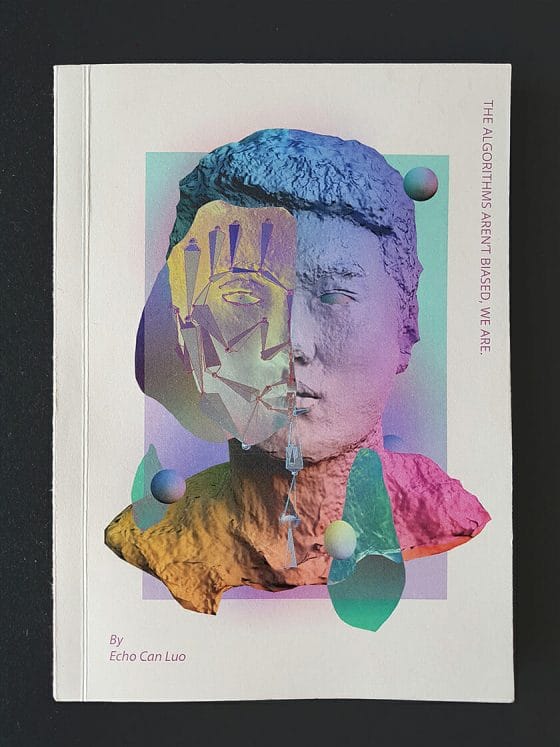The Algorithms Aren’t Biased, We Are.
– Thesis of ” Nicely nicely all the time!”
唉到底甚麼是二十世紀梨呀——
他們在海島的高山地帶尋到
相當於華北平原的氣候了,肥沃豐隆的
處女地,乃迂迴引進一種鄉愁慰藉的
種子埋下,發芽,長高
開花結成這果,這名不見經傳的水果
可憐憫的形狀,色澤,和氣味
營養價值不明,除了
維他命C,甚至完全不象徵甚麼
除了一顆猶豫的屬於他自己的心。
But what is a Twentieth Century pear?
They were found in the island’s mountainous region
a climate comparable to the northern China plains
and transplanted to the fertile, abundant virgin land
a seed of homesickness that sprouted, grew
and bore flowers and fruit―a fruit
whose pitiful shape, color, and smell were not mentioned in classics
Other than vitamin C its nutrient value is uncertain
lt symbolizes hardly anything
but its own hesitant heart.
(Yang Mu)
杨牧 杨牧诗选(1956-2013),有人问我公理和正义的问题,
广西师范大学出版社;第1版(2015年1月1日) – 杨牧
Yang Mu (Author), Lawrence R. Smith (Translator), Professor Michelle Yeh (Translator),
No Trace of the Gardener: Poems of Yang Mu. Yale: Yale University Press. 1998:167
In the 1980s, the Taiwanese poet Yang Mu composed a poem titled “Someone Asks Me Justice and Righteousness” in attempt to explore the issues that the Taiwanese youths had to deal with, such as cultural migration and identity under the circumstances of historical legacy. In the poem, Yang Mu fabricated a young man with uncertainties, who, premised on the doubts and confusions he felt on his own, wrote a letter to a distinguished scholar to ask questions including how the Taiwanese youths should deal with the identity issues, and how the youths should locate their own identities in the unjustifiable society. Metaphorically, Yang Mu referred to the young man as a pear which was transplanted from a frigid zone to the alpine environment.
在80年代的台湾,诗人杨牧,写了一首“有人问我社会公理与正义的问题”之诗,来论究在历史遗留原因之下,台湾年轻人所要面对的文化的迁移,身份认同等问题。在诗中杨牧虚拟了一位年轻人,满身疑问的年轻人,带着自己的疑惑与不解,写了一封信去请教一位自己尊敬的学者,让他来回答,台湾的年轻人应该如何去面对身份认同的问题,以及如何在不公正社会中自我定位。
In his words, it was a premature, vulnerable “20th-century pear”, which had transformed into a fruit with thoroughly unidentifiable content and appearance so as to adapt to the warmer climate in Taiwan.
杨牧将这位年轻人比喻成一颗从寒冷地带被移植到高山气候的一颗早熟且脆弱的二十世纪梨,它为了适应台湾温暖的气候,而改变,变成一种内容与样貌都模糊的水果。
By putting together the situations of the political system and the times behind the poem, it is not surprising to see that the uncertainties of the youths were due to the historical and political issues. Even though I live in an age different from what is depicted in the poem, I and the young people like me today, who have to constantly migrate for various reasons, just as the young man in the poem, have undergone prematurity and vulnerability both physically and psychologically in order to adapt to the dual or even multiple social, political, cultural circumstances. In such a context, however, I don’t view the vulnerable or premature characteristic as a pejorative expression. It is such a set of traits that allows us to be sensitive and pensive so as to reflect on and better understand the significance of existing in different social contexts.
联系创作这首诗背后的政治环境与年代背景,便可知台湾的年轻人是因为历史与政治的原因而产生了这样的疑惑。虽然我生活在与诗中所写的不同的年代,但我想今天的我或者和我一样因为各种理由而要去不断迁移的年轻人。为了适应两种或者多种不同的社会政治文化,所要承受的身体上的,心理上的,脆弱与早熟。但在这样的语境里,我并不认为脆弱与早熟的特质是带有贬义的,正因为这样的特质,我们变得敏感与多思,从不同的社会背景里去思考与理解,我们存在的意思。
Why this topic?
为什么会选择这个主题?
Upon my planning to work on this subject matter, a friend told me that it didn’t make sense to create works of this kind, and things would not change even though they were thought to be wrong, because “This is the way the world is, we could change neither others nor ourselves”.
2017年,当我刚开始想要做关于这个主题的作品的时候,有朋友对我说,你做这样的作品是没有意义的,因为他知道即使是错的,他也不会改变。因为这个世界就是这样的,你改变不了任何人,你也改变不了你自己原本的样子。
While I had had some doubts about moving on with my research, I went on. No one is an innate racist, so why would those, who have no knowledge of the unfamiliar things not be less prejudicial and spiteful, or at least be a bit benevolent and treat the other different from himself/herself, for the sake of a better understanding of differences in culture and race?
我也产生过怀疑,但是最终我还是决定继续做下去。因为没有人生下来就是种族歧视者,为什么有人可以从一个没有都不知道的人,变成对陌生的东西带有偏见与歧视,而不会因为多了解了一些不同的文化或种族,而变得不再带有偏见与恶意,或至少变得稍微友善一点的去对待一个与自己不同的人呢?
At the very beginning, all I felt was heightened confusion and intense anger, however, up to now, I would rather figure out why they behaved this way, why they singled me out and why they had such a stance. I have been wondering, behind the fear, indifference, hatefulness, hatred, self-righteousness and arrogance, what they have undergone. Talking about the other side of my criticism on their attitude, in fact, I barely know anything about how they live their lives and what they have experienced.
一开始我只有不理解的态度与愤怒的情绪,但现在我会更多的去思考,他/她为什么会有这样的行为,为什么要针对我? 为什么他/她会采取这样的态度? 我想在他/她这种害怕,无所谓,厌恶,憎恨,自以为是的高傲态度背后,他/她经历了什么,从批评他的态度的另一面来看,其实我也对他的生活与经历一无所知。
What are the main sources of the information they have obtained? Probably they got knowledge from people, books, the Internet or the media. In the society that he/she lives in, the information he/she receives and distributing of resources of all kinds are by no means equal, this readily affects his/her behavior to some extent. When rethinking such an issue in terms of the unevenness of information and resource, he/she simply visualized and symbolized a group of people based on his/her own knowledge structure instead of understanding on an individual basis.
他接受信息的主要来源是哪里?通过人,书本,网络,或者是媒体。因为在他生活的社会中,他接受到的信息与各种资源的分配也是不平等的,所以这也不同程度的影响了他的行为。当以信息与资源不对等为背景再次去思考的时候,会发现他也只是通过他现有的知识结构把人群图像化和符号化,而不是作为个体的去理解。
I constantly remind myself not to classify or label, when interviewing the specific groups of people in the process of creating the work. But no matter how much I try, such an issue was impossible to avoid. After all I aimed at specified groups of people to interview, and I am part of one.
所以我也时刻提醒自己,在创作这个作品的时候,即使针对特定的人群去采访,也不要将他们归类或者贴上标签。但是可能无论怎样注意,这个问题也无法避免吧,毕竟我就是针对了特定的人群去采访,而我自己呢,也是这样的人群中的其中之一。
Like many others in the world, I might have never considered this issue before I left China. At least such issues didn’t interest me.
和这个世界的很多人一样,可能在我没有离开中国生活之前,我也从来没有考虑过这个问题,至少对这样的问题,我并不关心。
Settling in Germany, I am racially different from most people, and I speak German with an accent. Such a difference, in every way, is like an invisible glass covering me all the time. Although I intended to create an artistic work without referencing my nationality or cultural background, I have been occasionally labeled as “Chinese”. It seems that I ought to include the cultural, political elements related to my background in my works since I came from China. Before reviewing my works, people would comply with a standard, namely I am a “Chinese artist”.
来德国生活以后,我有着和多数人不一样的种族,说着带着口音的德语,做任何事,这样的不同就像是一个无形的玻璃罩每分每秒都罩在我身上。即使想要创作一件与我自己的国籍和文化背景无关的作品,有时候还是会被贴上中国的标签,你来自中国,你就要用有关你文化政治的因素在你的作品里。或在分析我的作品之前,人家也会参考一个标准,就是你是中国的艺术家。
Interview –
1. Speaking about this topic, what is the first thing that comes to mind?
2. What would you pick to illustrate your memory if you are given one color?
故事采访 –
1.当说起这个主题的时候你第一个想起的是什么故事?
2.如果用一种颜色形容这个回忆,是什么颜色?
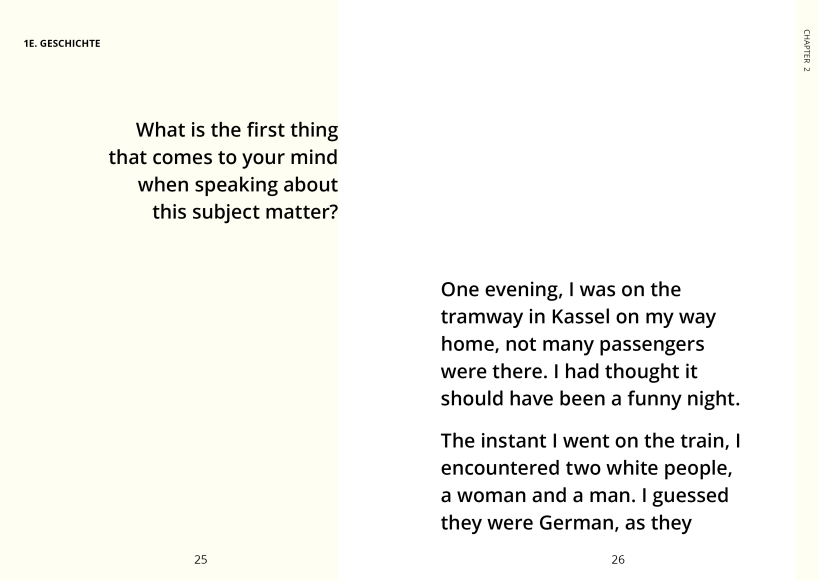

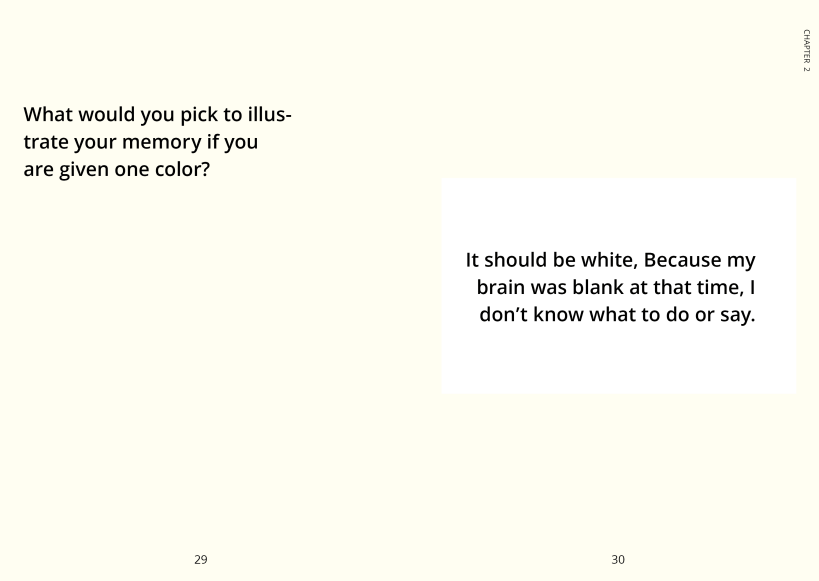
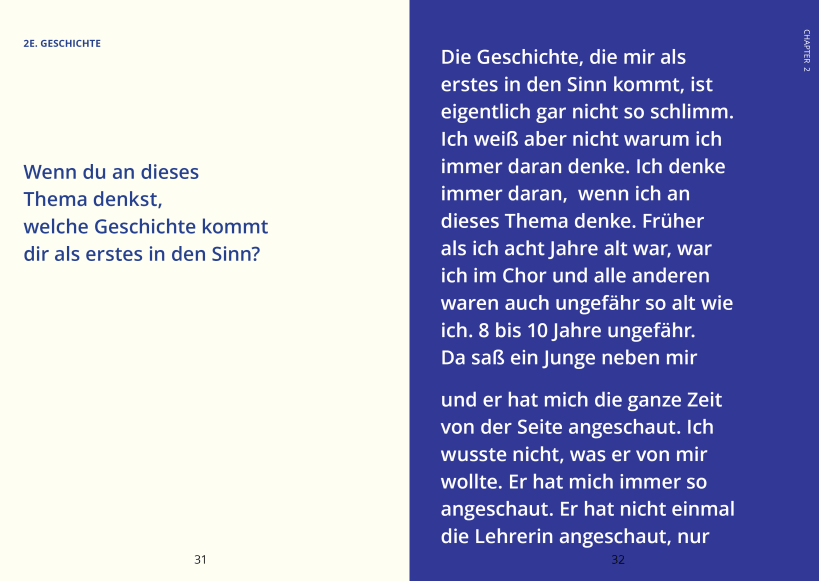
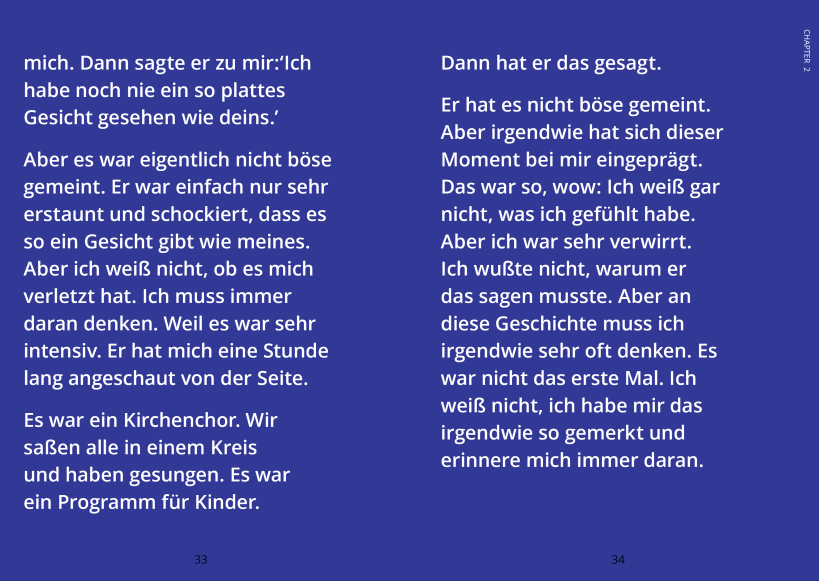
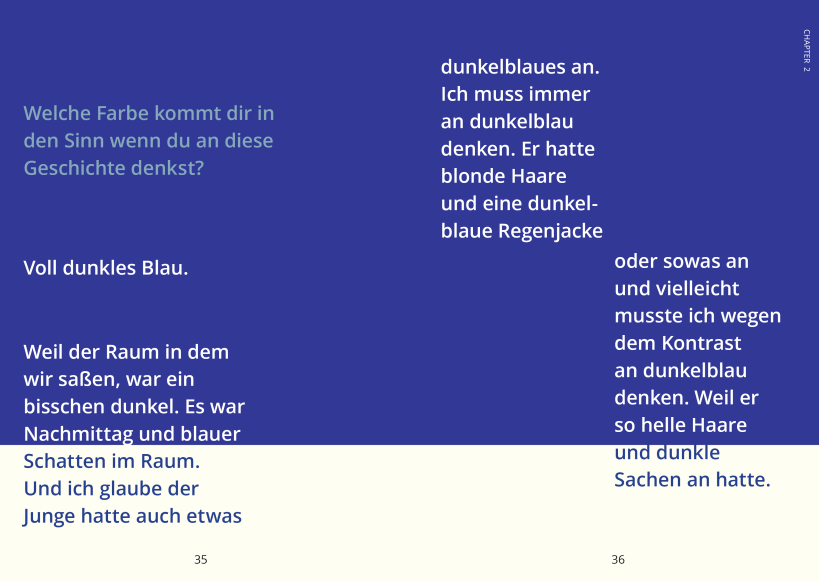
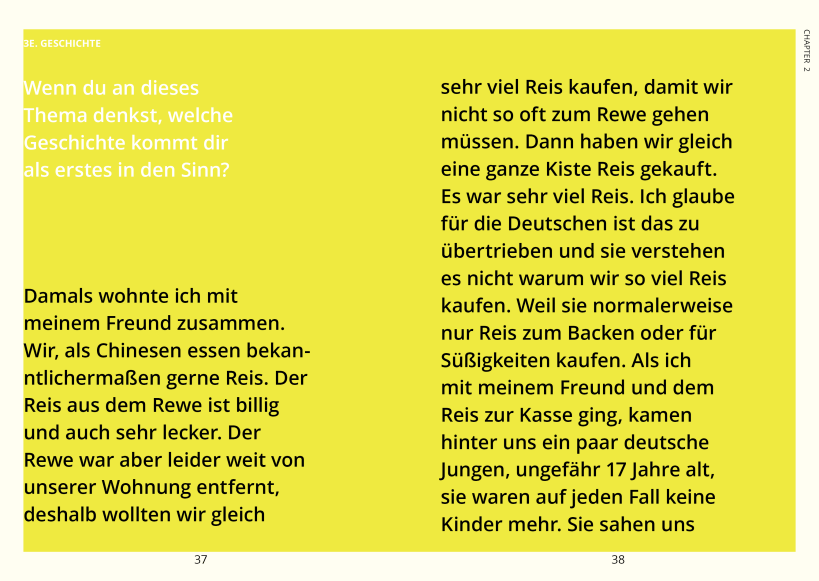
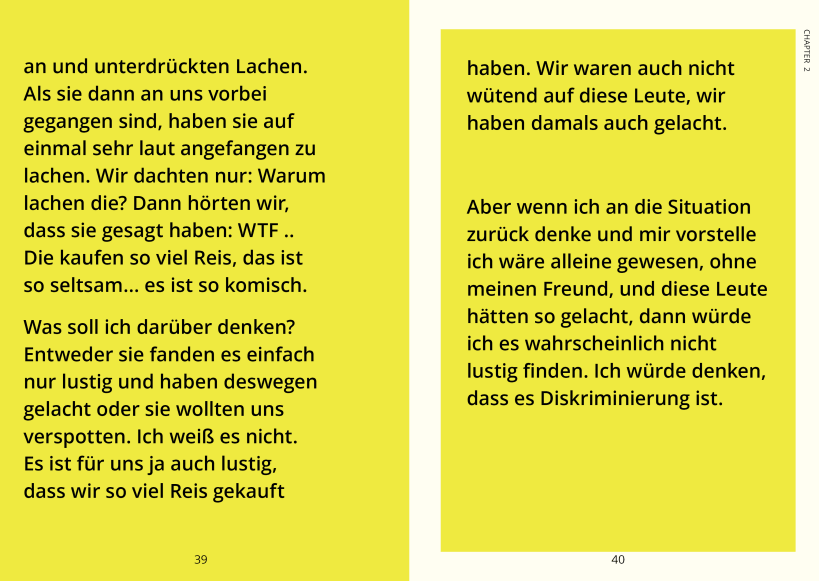
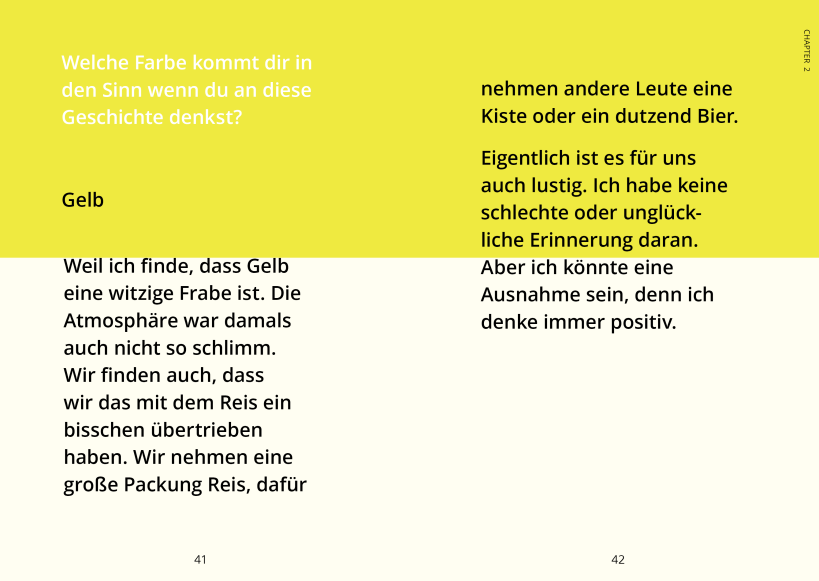
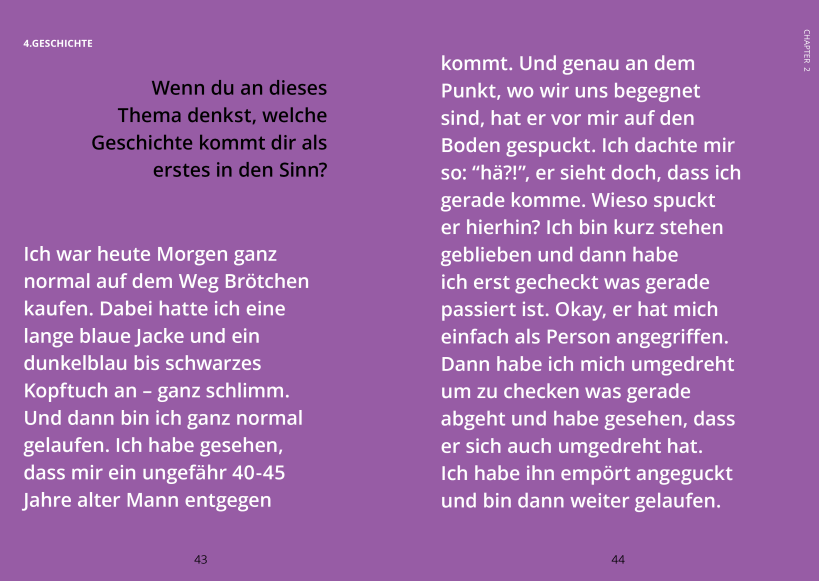
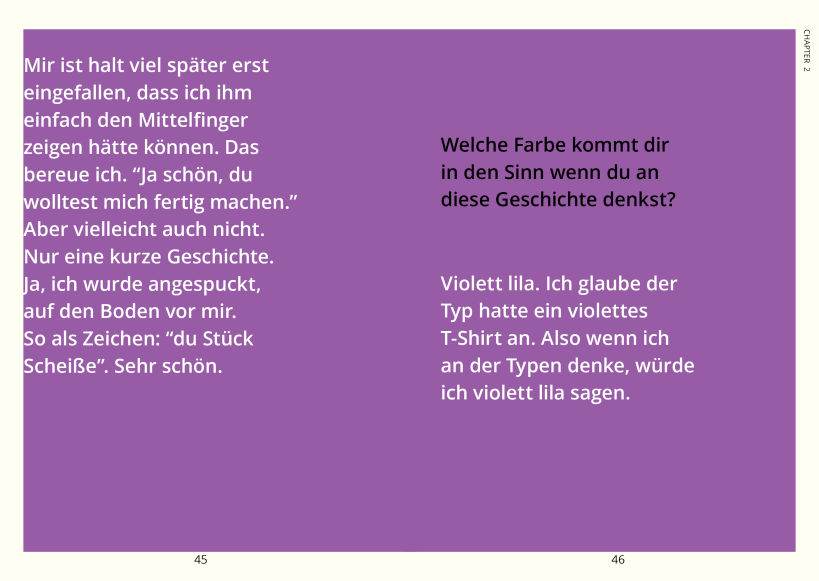
The Technical Testing
I had long been concerned with the technology of face tracking prior to the present project, and when finally deciding the subject of my graduation project, I determined to concentrate on the issues regarding human race and identity, in fact, distinguishing face and race is part of the technology of face recognition and tracking. In this sense, software and computing programs don’t only serve as tools, they function as an indispensable part of my creation.
人脸追踪技术我在进行毕业创作之前就一直有关注,而毕业创作选择主题的时候,我决定做关于人的种族与身份认同的主题,而人脸辨别与追踪技术本身就是一项需要区分不同脸部与种族的技术。所以在我的毕业作品里,软件与运算程序不仅仅只是作为一个工具存在,而是我创作的一部分。
Click here to see more:Testing-Research on Discrimination and Bias in Technology

